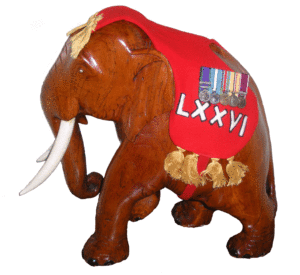The Dukes and Rugby
History of Rugby within the Regiment
1895 saw the creation of Rugby League, at an inaugural meeting at the George Hotel, in Huddersfield. The Northern Rugby Football Union was established as a breakaway faction of England’s Rugby Football Union (RFU). Both organisations played the game under the same rules at first, although the Northern Union began to modify rules almost immediately, thus creating a new faster, stronger paced form of rugby football. By the second half of the 19th Century over 50% of the rugby clubs in England were in the north of the country; the game being very popular with the working classes. This was continued with the break-away and formation of the Rugby League in 1895.
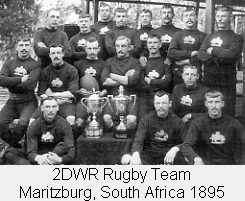 With our recruiting tradition already in the West Riding and the establishment of the Depot in Halifax in 1877 it was not long before the Regiments tradition of playing rugby began, with the 2nd battalion gaining early honours. This reputation and strength was constantly enhanced by the recruitment of officers with a flair for rugby.
With our recruiting tradition already in the West Riding and the establishment of the Depot in Halifax in 1877 it was not long before the Regiments tradition of playing rugby began, with the 2nd battalion gaining early honours. This reputation and strength was constantly enhanced by the recruitment of officers with a flair for rugby.
In those far off days of Rugby League, the thirteen-a-side game was played by all the elementary schools of Yorkshire, and thus the depot recruited a steady stream of recruits who played rugby. Because of this rugby ability the 2nd Battalion became the initiator of serious Regimental Rugby.
The Regiment went on to cement its soldiering and rugby prowess in South Africa and India.
In India between 1904 and 1914, the 1st Battalion won the Calcutta Cup nine times, the Madras Cup seven times and the Bombay Cup six times. The 2nd Battalion won the first ever newly instituted Army Challenge Cup in 1907. Since then the Regiment has won the Army Cup 14 times and have been runners up a total of eight times. In the Regiments heyday it won the Army Cup four years in a row, 1965 – 68. However, the Cup eluded us after 1981.
To celebrate the Regiments Tercentenary in 2002 the ‘Dukes’ took 30 players to New Zealand for a six-week tour playing both New Zealand Military and Club sides.
Rugby Individual Honours
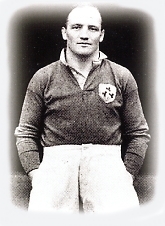
Lt (Horsey) BrownArmy & Ireland (12 Caps)
1925-1928
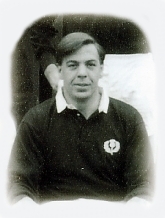
Capt Mike Campbell-Lamerton
Army, London Scottish, Scotland (23 Caps)
British Lions in South Africa 1962
Captain of British Lions in Australia & New Zealand 1966
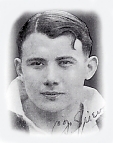
Army, Scotland & British Lions in South Africa during 1938
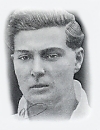
Army, England & British Lions in 1938
Since the early days the Regiment has produced an impressive amount of international players, representing England, Ireland and Scotland. CF Grieve and FJ Reynolds toured South Africa in 1938 with the British Lions. Brian Curry played for England in 1959, whilst Jack Scroby played for Great Britain and the army, as did Roy Sabine. Norman Field played for Great Britain in 1963 and later for Bradford Northern and Halifax. In 1965 Charlie Renison played for both Scotland and Great Britain. In the same year Arthur Keegan played for Great Britain. Yet our most successful player was Mike Campbell-Lamerton, who toured with the Lions to South Africa in 1962 and Captained the Lions in Australia and New Zealand in 1966. At one point in the 1950s England’s Half Back pair was DW Shuttleworth and EMP Hardy, who provided continuity to both England and the Dukes.
Brigadier DW Shuttleworth became President of the Rugby Football Union in the 1985/86 season.
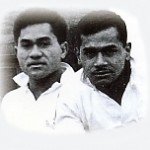
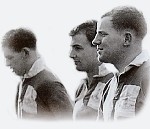
National Servicemen
Rugby League Stars
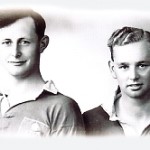
Army, Combined Services,
Headingly, Yorkshire & England
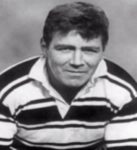
Army Caps
The ”Dukes’ have produced over 50 players that have been capped for the Army against the Navy and the Air Force since 1914.
The Teams
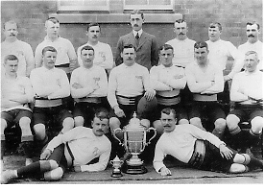
The 2nd Battalion 1906/07 Team,
Captained by Capt Denton
Winners of the 1st Army Cup Match
Score = 2DWR (5) – Trg Batt RE (0)
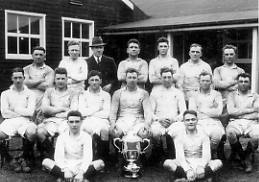
The 1st Battalion 1931/32 Team
Captained by Lt Miles
Winners of the Army Cup
Score = 1DWR (21) – Trg Regt RE (0)
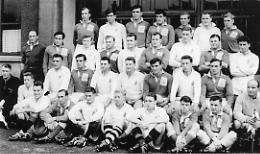
1DWR Team 1957/59
Captained by Capt Gilbert Smith
The Regiment v Ulster
Score = 1DWR (19) – Ulster (8)
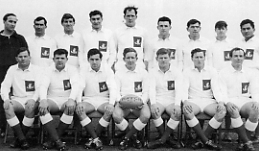
1DWR Team 1967
Captained by Capt Reid
Winners of the Army Cup
Score = 1DWR (14) – 7RHA (3)
The Battalion’s Northern Ireland Tour of 1957-59 saw the Battalion play Club Rugby across Northern Ireland. As the tour drew to an end Ulster honoured the Regiment by playing the Battalion at Ravenhill. The team, Captained by Capt Gilbert-Smith, produced an outstanding performance resulting in the Battalion taking a well deserved victory with a score of 19 to Ulster’s 8.
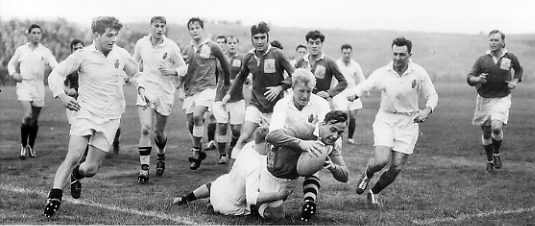
Whilst stationed at Osnabruck, West Germany, from 1965 to 1968, the Battalion had four consecutive victories in the Army Cup.
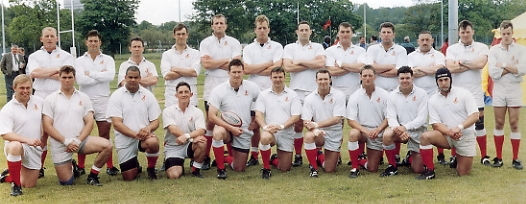
1DWR (15) – 7RHA (20).
Rugby Mascot
‘Albert’, a carved, wooden, Indian elephant was the rugby team’s mascot. He was kept in the Warrant Officers’ and Sergeants’ Mess and paraded at each rugby match, He was the longest-serving supporter of the rugby squad.
Regimental Rugby Song
The ‘Dukes’ are coming up the hill boys, the ‘Dukes’ are coming up the hill boys
They all laugh at us they all shout at us, they all say our days are numbered.
I blooming well told you, after yesterday’s display.
If the Welsh want the cup they had better hurry up, cos the dukes are taking it away.
Victorious, victorious, one bottle of beer between the four of us.
Glory be to God there isn’t any more of us, cos one of us could sup the blooming lot.
Rolling home, rolling home; by the light of the silvery moon;
happy is the day when a soldier gets his pay and he’s rolling, rolling, rolling, home.
We were drunk last night, We were drunk the night before,
We’re gonna get drunk tonight like we’ve never been drunk before.
Rolling home, rolling home, by the light of the silvery moon;
happy is the day when a soldier gets his pay and he’s rolling, rolling, rolling, home.
